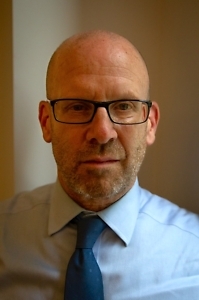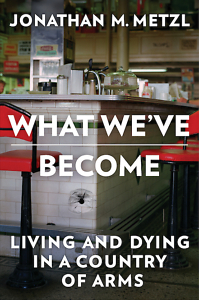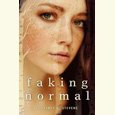Trepidation Is Big Business
Jonathan Metzl wants to reframe the gun debate
FROM THE CHAPTER 16 ARCHIVE: This review originally appeared on January 22, 2024. The post has been updated with new event information.
***
For years Jonathan Metzl and other public health professionals have been on the losing side of America’s gun debate. Despite marshalling mountains of evidence linking permissive gun laws to increased gun-related deaths, advocates of gun violence prevention have failed to keep red states from diluting reforms or passing legislation that makes deadly weapons easier to purchase and carry. Clearly, it’s time for a new strategy. In What We’ve Become, Metzl makes the case that gun reform advocates need to reframe the issue by envisioning a new social contract.

Gun violence is a local matter for Metzl, a Vanderbilt professor and director of the university’s Department of Medicine, Health, and Society. He was horrified by the 2018 Waffle House shooting in Nashville’s Antioch neighborhood, when a man carrying an AR-15 semiautomatic rifle entered the restaurant at 3:40 a.m. and opened fire, killing four people and wounding four others before being disarmed. The shooter, Travis Reinking, was captured the following day. Two troubling details about the shooting grabbed Metzl’s attention: Reinking, a tall, skinny white man, was naked during the shooting, and all of his victims were people of color.
Metzl’s book closely examines the Waffle House shooting as a way of illustrating the social context of Reinking’s actions, the devastation experienced by the victims and their families, and the callous reaction from Tennessee politicians. “A white man killed young adults of color using guns,” Metzl writes. “In turn, the state’s response would arm the next perpetrator, at the expense of the community at whom he shot.”
Metzl, who in Dying of Whiteness (2019) explored the self-destructiveness of racist politics, illuminates the rhetoric that extreme gun rights supporters deploy in response to mass shootings. First, they announce that the tragedy is the result of a mental health issue; then, after the afflicted community (Columbine, Parkland, Sandy Hook, Aurora, Uvalde, Nashville …) calls for common-sense gun control, they squawk that liberals are trying to turn a tyrannical government against law-abiding gun owners. So, they conclude, now is the time to protect the Second Amendment by expanding the rights of gun owners to acquire and wield lethal weapons.
 The problems with such rhetorical sleight-of-hand, as Metzl details, go beyond logical incoherence and brazen hypocrisy. By labeling mass shootings as “mental health” problems, they imply that mental health professionals should be able to supply the solution. They push “duty to warn” statutes that require mental health practitioners to report to police any patient who poses a threat of violence. In reality, though, Metzl notes that “only about 4 percent of violence in the United States is attributed to people diagnosed with a psychiatric disorder.” The sane are, statistically, “far more dangerous” than the mentally ill.
The problems with such rhetorical sleight-of-hand, as Metzl details, go beyond logical incoherence and brazen hypocrisy. By labeling mass shootings as “mental health” problems, they imply that mental health professionals should be able to supply the solution. They push “duty to warn” statutes that require mental health practitioners to report to police any patient who poses a threat of violence. In reality, though, Metzl notes that “only about 4 percent of violence in the United States is attributed to people diagnosed with a psychiatric disorder.” The sane are, statistically, “far more dangerous” than the mentally ill.
Metzl demonstrates that the “mental illness” explanation of shootings is a dodge to justify inaction. If politicians truly believed that the solution to gun violence is taking weapons out of violent hands, they would support red flag laws, which allow citizens to report to police concerns about dangerous friends or family, leading to the confiscation of guns. But red state Republicans have repeatedly resisted such legislation, arguing that it would impinge on the rights of lawful gun owners, thereby reducing their ability to protect themselves from homicidal madmen — exactly the people that red flag laws are meant to identify.
The case of Travis Reinking illustrates how red flag laws should work, but also how America’s legal inconsistency undermines our attempts to prevent gun violence. While living in Illinois, Reinking lost his gun permit and had his weapons taken by local police, who immediately turned them over to Travis’ father for safekeeping. When Travis decided to move to Tennessee, where the gun laws were “exponentially more permissive,” his father gave him back his guns, a decision Metzl describes as a “catastrophic personal choice” and, more importantly, as a “system failing, an American failing.”
In addition to analyzing the political “dialectic” surrounding guns, Metzl assesses the economics of the gun industry. When mass shootings occur, Americans buy guns for protection; when reformers announce campaigns to restrict gun sales, buyers stockpile them against possible future prohibitions. As Metzl puts it, “Trepidation is big business.”
Metzl’s book offers positive directions for America to pull out of this death spiral. To move forward, gun control advocates must find common ground with gun owners by “linking gun safety reform with housing, health care, education, voting rights, transit, crime reduction, and economic betterment.” Among the “interventions” that Metzl prescribes (expand the public health framework, improve the social safety network), the most important, and difficult, is to “develop a better Southern strategy,” that is, to be realistic about the stranglehold of “gunpower” in the South and how it might be challenged with an alternate, long-term vision. What We’ve Become paints a dark picture of the hole we have dug for ourselves but also offers a set of tools for how to climb out of it.

Sean Kinch grew up in Austin and attended Stanford. He earned a Ph.D. from the University of Texas. He now teaches English at Montgomery Bell Academy in Nashville.


